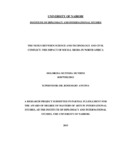| dc.description.abstract | Social media, by facilitating deliberative political processes, can have a supportive role in the post-regime phase. All evidence indicates that far from being a spontaneous event catalysed by technology, the North African story is one of the agencies of a disciplined civil resistance movement through the four phases of a political revolution 'arc': preparation, ignition, escalation and post-regime. Social media made a profound difference in the preparation phase through changing the political opportunity structures for revolution. Social media had an amplifying impact at the ignition phase, by enabling the trigger to go viral. The escalation phase was the point at which social media became visible, but its role was contributory rather than central. International visibility came at this point via social media, the blogosphere leading traditional Western media coverage of events. The use of social media is likely to be a relatively important feature of future political activism across the world and has changed the communications environment for all actors. Existing research into social revolution and political mobilization has shown how ineffective methodology could precipitate occurrence and resurgence of revolutions and intrastate conflicts. This research seeks to evaluate the Nexus between science and technology and civil conflict: The impact of social media in North Africa. The research was guided by the social movement theory which entailed mutual combination of factors used by social media user and political actors and civil society in dealing with the revolution in North Africa. Data for this study was obtained from primary and secondary sources. The sample size for the study will be 50 staff in embassies of Tunisia, Egypt, Libya and Morocco. The data was obtained by conducting a field research, using questionnaires, and interviews. Guided by the objectives and premises of the study, the data was analysed and arranged according to the major themes highlighting the role social media played in North Africa uprising. The findings from the research will provide evidence for effective use of the abilities held by social media in achieving peace in future conflicts. The findings will provide a critical model of how social media and new media are able to ensure that peace is achieved. After the interpretation and discussion of the data, conclusions were drawn and recommendations for further research given | en_US |

